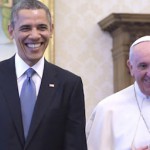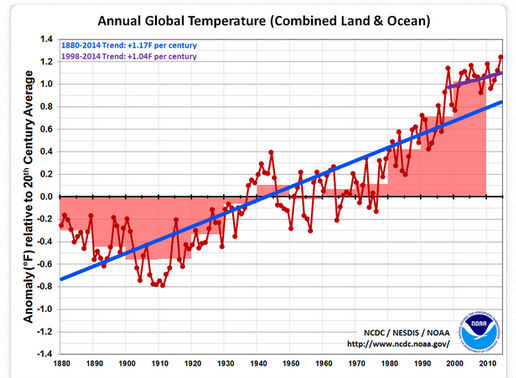The climate crusaders gained a “useful idiot” (look it up) in their cause this past week in one Pope Francis with the publication of his encyclical “Laudato Si’, On the Care of Our Common Home.” Apparently the “settled science” and endless “climate shaming” over our “carbon-footprint” has been insufficient to motivate action (that is violence) at a global level – time to bring in the big guns: God. If people won’t listen to reason then let’s appeal to their sense of morality. And if that doesn’t work let’s just bombard them with vacuous nostrums that would embarrass even Deepak Chopra . Writing in his encyclical the Pope states, “There can be no renewal of our relationship with nature without a renewal of humanity itself.” Flowery prose about a collective (“our”) that exists only as metaphor underscores how our “leaders” perennially view humanity not as individuals but rather as mere clay to be pushed, prodded — and trimmed — as needed in order to reshape the world according to their vision.
As a Catholic myself (this statement now giving me a pass on the anti-Catholic label) I am dismayed by this Pope’s proclivity to not only issue papal pronouncements on issues he is ignorant of (e.g. economics, the climate) but to deliver those messages wrapped in an unabashedly pro-state and curiously un-biblical package. This Pope (and Vatican) have spewed a mountain of anti-capitalist rhetoric over the past few years that entirely misses the mark as to the cause of rising wealth inequality. It is entirely the result of big government and central banks colluding together to inflate the money supply and not, as he says, by “ideologies which uphold the absolute autonomy of markets and financial speculation.” This is no mere pontificating on the dangers to the soul of single-minded pursuit of wealth, no, this is full on promotion of Marxist redistribution of wealth. For example from the above quote he further endorses, “…the right of control [of financial resources] to States…”. When he spoke to the UN last year he invoked the parable of Zaccheus as a way to justify the use of “political agents” that can force the “legitimate redistribution of economic benefits.” Wow. I wonder if he wears a Che Guevara t-shirt under that robe.
The Vatican even promotes the concept that evading taxes is equivalent to “stealing” from the state and the poor (because of course it’s all the state’s to begin with and their sole job is to help the poor). I’m not sure which version of the Bible Pope Francis is reading, but in my version Zaccheus (the selfish tax collector) VOLUNTARILY chose to give to the poor. Jesus didn’t say “do this or else I’ll send the Roman guards after you”.
To underscore this Pope’s preference for state action, his new encyclical distills the fight against climate change down to a simple message: governments everywhere have a moral duty to fight climate change. Yes, you read that correctly. Fighting climate change is now a moral imperative for all mankind. The unique thing about this new flavor of “morality” is its ambiguity. Traditional moral issues (murder, rape, theft) are pretty straightforward: don’t do them. As long as I don’t murder someone, I have upheld that moral edict. But “fighting climate change”? How do I uphold that? What exactly am I supposed to do? If I drive a car that gets 30 mpg am I violating a moral tenet but not violating if it gets 40 mpg? Shall I get rid of my air conditioner (as Pope Francis has actually suggested!) in order to get in God’s good graces? Or should I just follow like a good little subject the climate edicts of my government… which may change with the prevailing winds of the latest computer model. This ambiguity should be more than sufficient to indict its moral status.
The Pope should indeed be promoting ideas of charity, peace, forgiveness, tolerance, and good stewardship. But to then endorse the authority of the state to impose these virtues upon the population is to utterly reject God’s message of salvation via the gift of free will. He gave us free will in order to allow the individual to make his or her own choices (choices which may or may not eventually lead to salvation). Apparently this Pope’s message is, “Do the right thing, but if you don’t, that guy over there (the state) will make sure you do.”
It is absolutely astounding that a Pope would make not just one but two gross theological blunders. First to cloak an ambiguous political issue in the vestments of morality and second to endorse the sacrifice of God’s gift of free will upon the altar of state sponsored utilitarianism. I don’t know whether to laugh at his brazenly sycophantic parroting of regime talking points or to cry for the untold billions that will die in the coming decades due to artificial constraints on energy production and economic output if the chicken little doomsayers like the Pope get their way.


